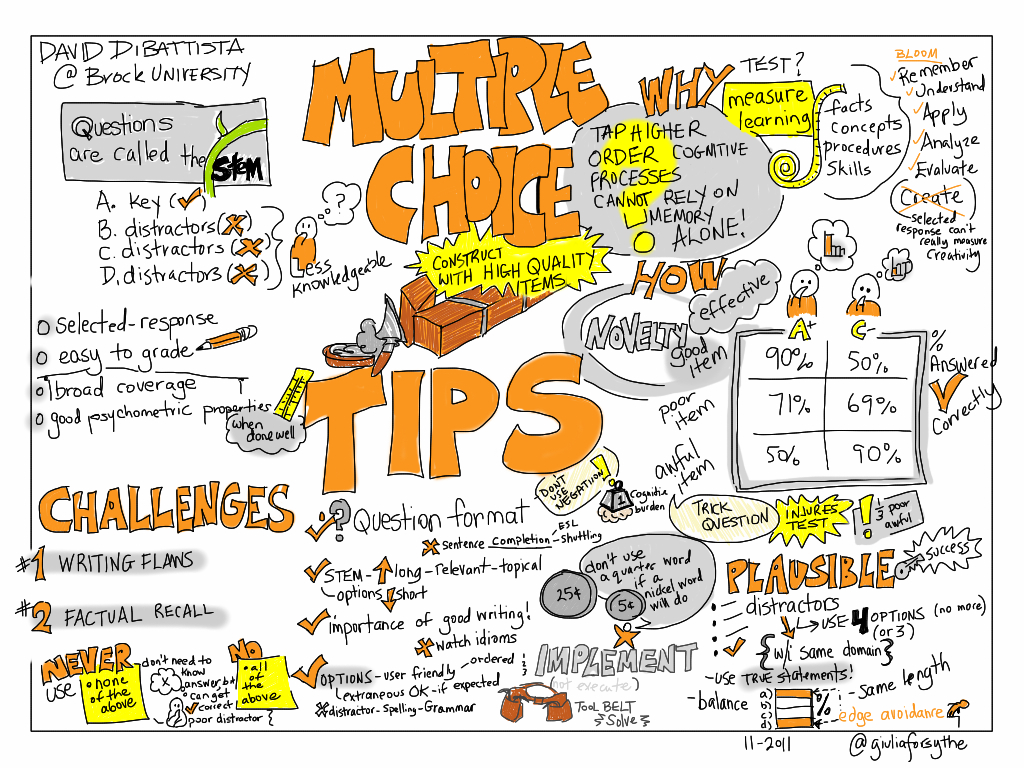10.4 Study Strategies – Know the Question Types
Action
The Secrets of the Q and A’s
You can gain even more confidence in your test-taking abilities by understanding the different kinds of questions a professor may ask and applying the following proven strategies for answering them. Most professors will likely use various conventional types of questions. Here are some tips for handling the most common types.
Multiple-Choice Questions

Read the instructions carefully to determine if there may be more than one right answer. If there are multiple right answers, does the professor expect you to choose just one, or do you need to mark all correct options?
- Read each question carefully and try to answer it in your head before reading the answer options. Then consider all the options.
- Eliminate first the options that are clearly incorrect.
- Read the questions and one of the options as a sentence and turn it into a True/False question.
- Look for clue words that hint that certain option answers might be correct or incorrect.
- Ensure the option you choose best matches what the question is asking.
True-or-False Questions
Answer the questions that are obvious to you first. Then go back to statements that require more thought. If the question is stated in the positive, restate it to yourself in the negative by adding the word “not” or “never.” Does the new statement sound truer or more false?
Short Answer Questions
Short answer questions are designed for you to recall and provide some very specific information: When you read the question, ask yourself what exactly the professor wants to know. Keep your answers short and specific.
Essay Questions
Essay questions are used by professors to evaluate your thinking and reasoning applied to the material covered in a course. Good essay answers are based on your thoughts, supported by examples from classes, and reading assignments.
- Careful planning is critical to answering essay questions effectively. Note how many essay questions you have to answer and how difficult each question seems. Then allocate your time accordingly.
- Read the question carefully and underline or circle keywords. Watch for words that describe the professor’s expectations for your response.
- If time allows, organize your thoughts by creating a quick outline for your essay. This helps ensure that you don’t leave out key points, and if you run out of time, it may pick up a few points for your grade. Jot down specific information you might want to use, such as names, dates, and places.
- Introduce your essay answer, but get right to the point. Remember that the professor will be grading dozens of papers and avoid “filler” text that does not add value to your answer.
- Write in direct and concise statements.
- Write neatly and watch your grammar and spelling. Allow time to proofread your essay. You want your professor to want to read your essay, not dread it. Remember that grading essays is largely subjective, and a favourable impression can lead to more favourable grading.
- Be sure to answer all parts of the question. Essay questions often have more than one part. Remember, too, that essay questions often have multiple acceptable answers.
“16 Tests” from A Guide for Successful Students by Irene Stewart and Aaron Maisonville is licensed under a Creative Commons Attribution-NonCommercial-ShareAlike 4.0 International License, except where otherwise noted.
Designed for you to recall and provide some very specific information.
Used by professors to evaluate your thinking and reasoning applied to the material covered in a course. Good essay answers are based on your thoughts, supported by examples from classes, and reading assignments.

